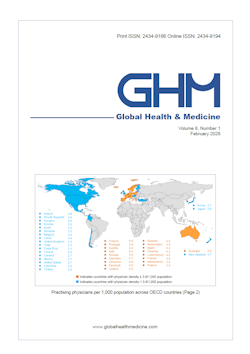Global Health & Medicine 2025;7(5):352-357.
Reconceptualizing ageing societies: Six years of global dialogue from Japan
Nakatani H
This article synthesizes six years (2019–2024) of the "Super Active Ageing Society" (SAAS) international conference series, which reconceptualizes ageing not as a burden to society but as a source of societal vitality. The SAAS conferences uniquely integrate three traditionally isolated domains — health, economic resilience, and welfare — into a cohesive framework that positions older adults as active contributors to society. In addition to themes such as preventive health, asset longevity, and extended workforce participation, the conferences promote intergenerational collaboration and financial sustainability. To achieve what older adults aspire to — remaining healthy, economically secured, and socially connected — demands a cross-sectoral response. Evolving from interdisciplinary presentations to strategic dialogues, the conferences were attended by a diverse range of participants, including but not limited to policymakers, researchers, practitioners, students, industry leaders, and civil society representatives. Collaboration with the Well Aging Society Summit Asia-Japan (WASS) fostered dialogue on Japan's ageing-related industries, in synergy with the SAAS. In these bilingual (Japanese and English) conferences, over 40% of on-line participants tuned in to the English channel, underscoring the international interest in the ageing discourse. Over the course of six conferences, the concept of a super active ageing society — integrating health, financial well-being, and social participation — is refined, offering new perspectives for both domestic and international policies and business strategies. The outcomes of this conference series clearly underscore the need for innovation and social transformation in ageing societies, and provide valuable insight for ongoing and future policy and institutional design.
DOI: 10.35772/ghm.2025.01107







